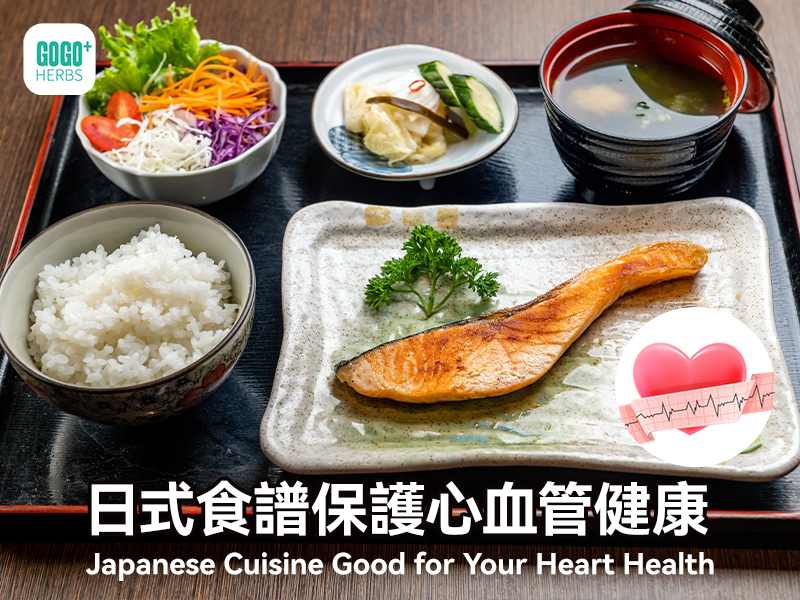
Japanese Recipes for Cardiovascular Health
The food we consume every day has a direct impact on the changes of blood glucose in our body. According to a Japanese study, more than 14 million Japanese people are suffering from a rapid rise in blood sugar after meals. Even if you have not been diagnosed with diabetes, this fluctuation in blood sugar can unknowingly cause damage to blood vessels, which can lead to a series of health problems in the long run.
The importance of stabilising blood glucose should not be overlooked
Blood glucose testing is usually divided into three main indicators: fasting blood glucose, post-meal blood glucose and average blood glucose, which are the basic items commonly found in health check-ups. Under normal circumstances, fasting blood glucose will remain within a stable range, while blood glucose after meals will fluctuate depending on the contents of the meal.
Generally speaking, blood glucose reaches its peak about 1 to 2 hours after eating, and the normal range should be kept below 140mg/dl. If blood glucose frequently exceeds this value after meals, even if diabetes has not yet developed, it may already be potentially harmful to the body, especially to the blood vessels causing chronic damage, which in turn increases the risk of myocardial infarction, angina pectoris, cerebral stroke and other cardiovascular diseases. In addition, chronic fluctuations in blood glucose have been linked to the development of dementia and certain types of cancer.
Disease Risks Increase with Worsening Blood Sugar Fluctuations
According to Ginza Taiei Internal Medicine Clinic, a renowned clinic in Japan specialising in the treatment of diabetes, when blood glucose remains high for a long period of time, it not only affects insulin function, but also significantly increases the chances of developing a number of chronic diseases. Studies have shown that people with poor blood sugar control have a 1.9 times higher risk of cardiovascular disease, a 1.6 times higher risk of cancer, and a 1.5 times higher risk of dementia than the general population.
Miso soup with tomato helps stabilise blood sugar after meals
For how to eat well through your daily dietControl of blood sugarDr Yasue Shintaro, Director of Ginza Taie Internal Medicine Clinic, offered specific advice. As a leading expert on diabetes in Japan, he emphasised that the core of dietary management is to "reduce sugar and carbohydrate intake", recommending that each patient's daily intake of sugar should be limited to 150 grams.
With this dietary premise in mind, Dr Taie recommends a simple yet practical combination: adding tomatoes to miso soup can help to effectively control the rise in blood sugar after meals. Miso soup is a very common soup in the traditional Japanese diet, mainly made from grains such as soybeans, rice or wheat, fermented with salt and koji bacteria to make miso. This fermentation process produces isoflavone derivatives, which have antioxidant, anti-inflammatory and anti-allergic properties.
According to a large, 20-year dietary tracking study released in March 2019 by the National Cancer Centre of Japan, which tracked the dietary habits and risk of death of 80,000 men and women between the ages of 40 and 69 years old, women who consumed soy-based foods on a regular basis had a significantly lower risk of cardiovascular disease and mortality.
Lycopene in tomatoes is a good helper in controlling sugar.
On the other hand, tomatoes are rich inLycopeneTomato is a powerful natural antioxidant that has been shown to lower HbA1c values, which has a positive effect on stabilising blood sugar. In addition, tomatoes contain phosphorus, iron, potassium, sodium, magnesium and vitamin C, which help to supplement the body's daily needs for trace elements and vitamins.
When tomatoes are paired with miso soup, the lycopene in tomatoes will synergise with the beta-conglycinin in miso to further increase the concentration of adiponectin in the body. Adiponectin is a hormone secreted by fat cells, which can promote the normal secretion of insulin and improve insulin sensitivity, which is helpful in controlling blood sugar after meals.
Taken together, miso soup with tomato is not only a well-balanced and tasty home-cooked dish, but also a simple and practical dietary strategy that can help stabilise blood glucose after a meal, reduceChronic disease riskIt is suitable for people who are concerned about their health, especially those who need to manage their blood glucose, to consume it on a daily basis.
Related Post:
Related Products:
-
Sale!
 Out of stock
Out of stock
Webber Naturals – Triple Strength Omega-3 (900mg EPA / DHA) 200 capsules Value Pack
Original price was: $398.00.$280.00Current price is: $280.00. Add to basket -
Kirkland Signature – Omega-3 Concentrated Deep Sea Fish Oil Pills 1300mg 330 Capsules
Original price was: $350.00.$298.00Current price is: $298.00. Add to basket -
GNC – Triple Super Fish Oil Mini Capsules 240 Capsules
Original price was: $298.00.$245.00Current price is: $245.00. Add to basket -
Swisse – Ultiboost Odorless High Concentration Wild Fish Oil 1500mg 400 Capsules
Original price was: $298.00.$220.00Current price is: $220.00. Add to basket





































































